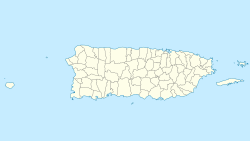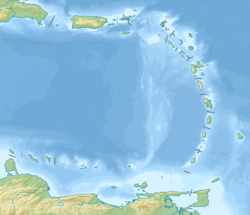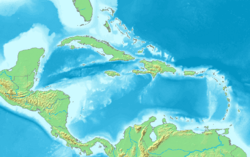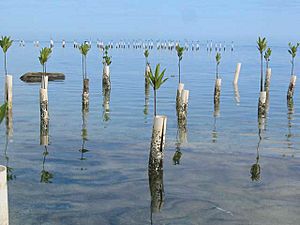Isla de Ratones (Cabo Rojo, Puerto Rico) facts for kids
|
Nickname: Ratones
|
|
|---|---|
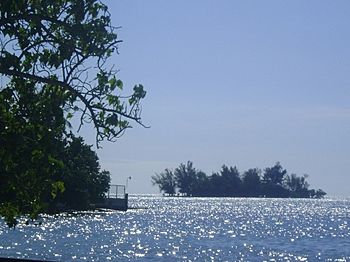
Isla de Ratones with sun gleaming on the sea
|
|
| Geography | |
| Coordinates | 18°06′59.84″N 67°11′18.00″W / 18.1166222°N 67.1883333°W |
| Administration | |
| Territory | Puerto Rico |
| Municipality | Cabo Rojo |
| Barrio/Ward | Joyuda |
| Demographics | |
| Population | 0 |
Isla de Ratones means "Mice Island" in English. It is also called Cayo Ratones or Isla Ratones. This small island is located near the Joyuda Lagoon in Cabo Rojo, Puerto Rico. It is a popular place for snorkeling and swimming.
Island History
The island was first known as Piñas or Piñero Island. This means "Pineapple Island." In the past, people grew pineapples and sugar cane there.
Later, the island was left empty for many years. It became like a trash dump. Because of this, people in Joyuda started calling it "Isla de los Ratones." This was because many rodents lived on the island.
In the mid-1900s, Don Alfonso Valdés Cobián owned the Cerveceria India company. He helped clean up the small island.
In 1988, the island was sold to MTV. They planned a "fantasy island" contest with Cyndi Lauper. But after many protests, MTV's plans did not happen.
Today, the Puerto Rico Department of Natural and Environmental Resources (DRNA) takes care of the island. They work with Tourmarine, a private tourism company. They help clean up the island together. This is important because the DRNA does not have enough staff.
Every year, the Joyuda Triathlon happens in Cabo Rojo. One part of this race involves swimming to the island and back.
Restoration Efforts
In 2005, an environmental group called Caborrojeños Pro Salud y Ambiente started a project. They worked on the island's north shore. Their goal was to stop erosion and dirt buildup. This dirt was harming the coral reef and mangrove forest around the island.
The island has shrunk by almost half in the last 60 years. This happened because of coral bleaching and reef damage. Waves and currents also caused damage.
In 2006, the Inter American University of Puerto Rico got a grant. It came from NOAA and the Gulf of Mexico Foundation. This money helped with the second part of the restoration project.
Students, teachers, and group members worked together. They planted about 400 floating seeds of Red Mangrove. These mangroves are an important part of the island's natural environment. About 0.25 acres (0.10 hectares) of mangrove habitat were restored. Also, a small artificial reef was created.
See also
 In Spanish: Isla de Ratones para niños
In Spanish: Isla de Ratones para niños


